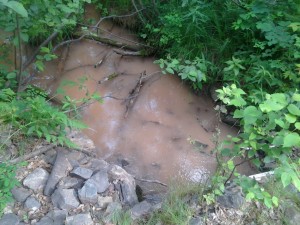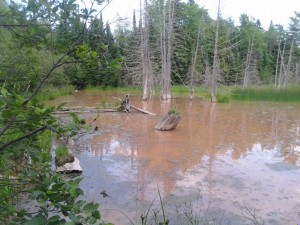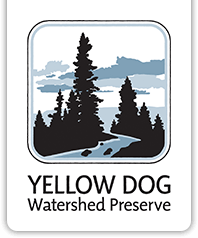
Blog > Road Work on County Road AAA Polluting Wetland
Road Work on County Road AAA Polluting Wetland

Over the past two weeks, Yellow Dog Watershed Preserve has been investigating and documenting a serious water quality concern caused by the road construction on the County Road AAA. A spring that feeds the East Branch of the Salmon Trout River had been ruptured during construction activities and it is releasing spring water into construction areas. The eruption of water caused significant and severe runoff of sediment into the stream. From there, the sediment was transported into a wetland downstream. After the wetland reached its capacity, the sediment continued downstream into the East branch of the Salmon Trout River.
Massive releases of sediment can cause damage to local streams and wetlands. Suspended sediment can clog the gills of native trout, increase mortality of aquatic insects that the trout feed on, and fill in the deep holes and undercut banks where trout seek refuge. In addition, wetlands that have experienced this level of sedimentation can no longer function as a “filter” that keeps streams healthy.

The Michigan Department of Environmental Quality and Michigan Department of Natural Resources were notified of the situation and they have visited the site. Improved erosion control measures were installed at their request. However, the damage is done and substantial amounts of sediment are still moving through the waterway. The once crystal clear water still looks like chocolate milk even after additional erosion control measures have been installed.
The Yellow Dog Watershed Preserve is sending a formal complaint letter to MDEQ, urging them to issue a citation for polluting the water. We are also urging the agency to require the implementation of a mitigation plan to clean up the site. At this time, we are also informing the EPA and tribal entities of the incident.
YDWP will continue to monitor the site conditions and collect water samples. Also, we have conductivity loggers on this stretch of river which continuously collect measurements every 30 minutes. We can compare the measurements recorded over the past week during the incident to our previous year’s data to conclude water quality impacts.
This incident closely follows a different incident on the Mulligan Creek which the Yellow Dog RIVERKEEPER ® discovered in early July. A wetland had been filled in with trees and permit conditions had been violated. The DEQ has also been informed of this issue and has visited the site.

These issues, without enforcement, can lead to cumulative stress on our local waterways. Help keep this work up by donating today: www.yellowdogwatershed.org/blog/donations.

